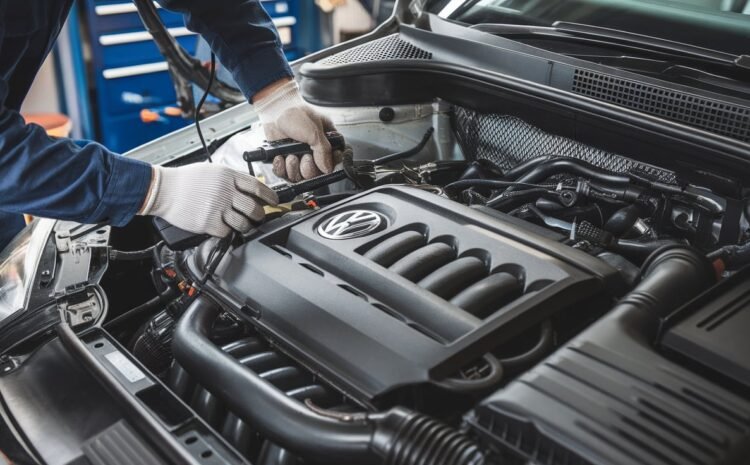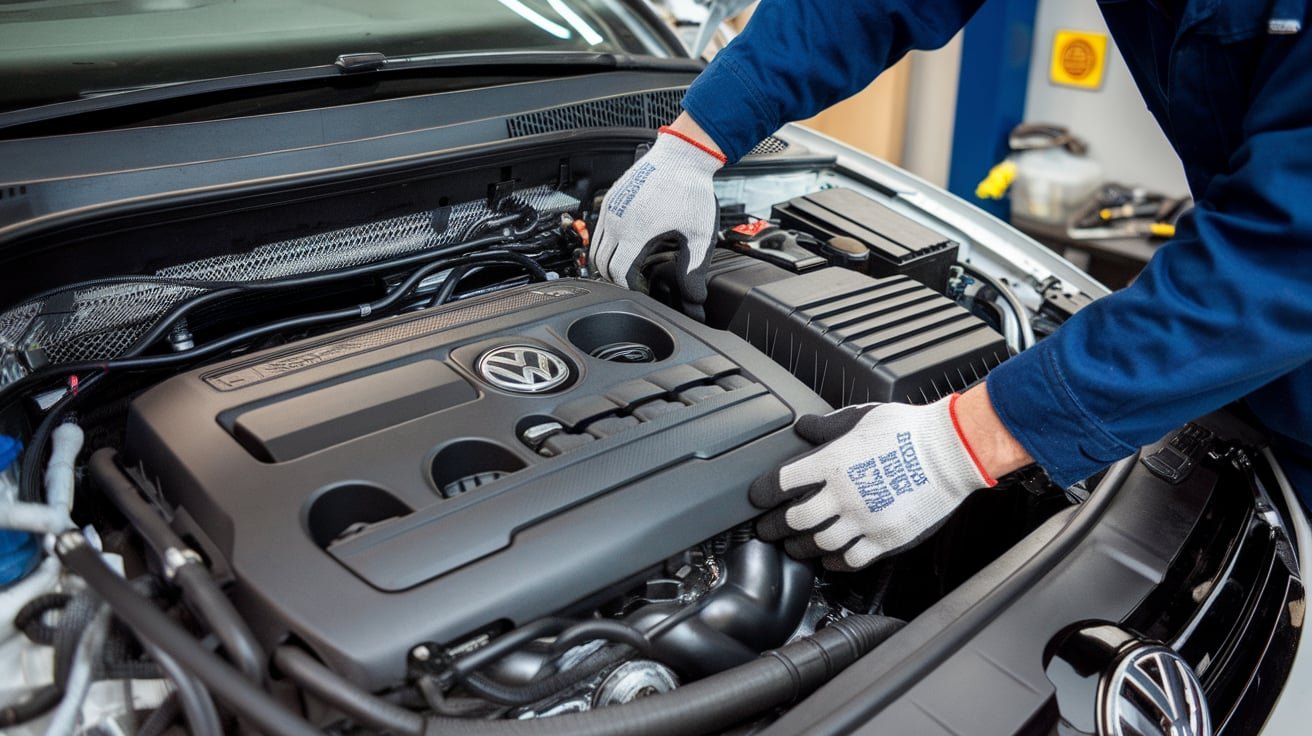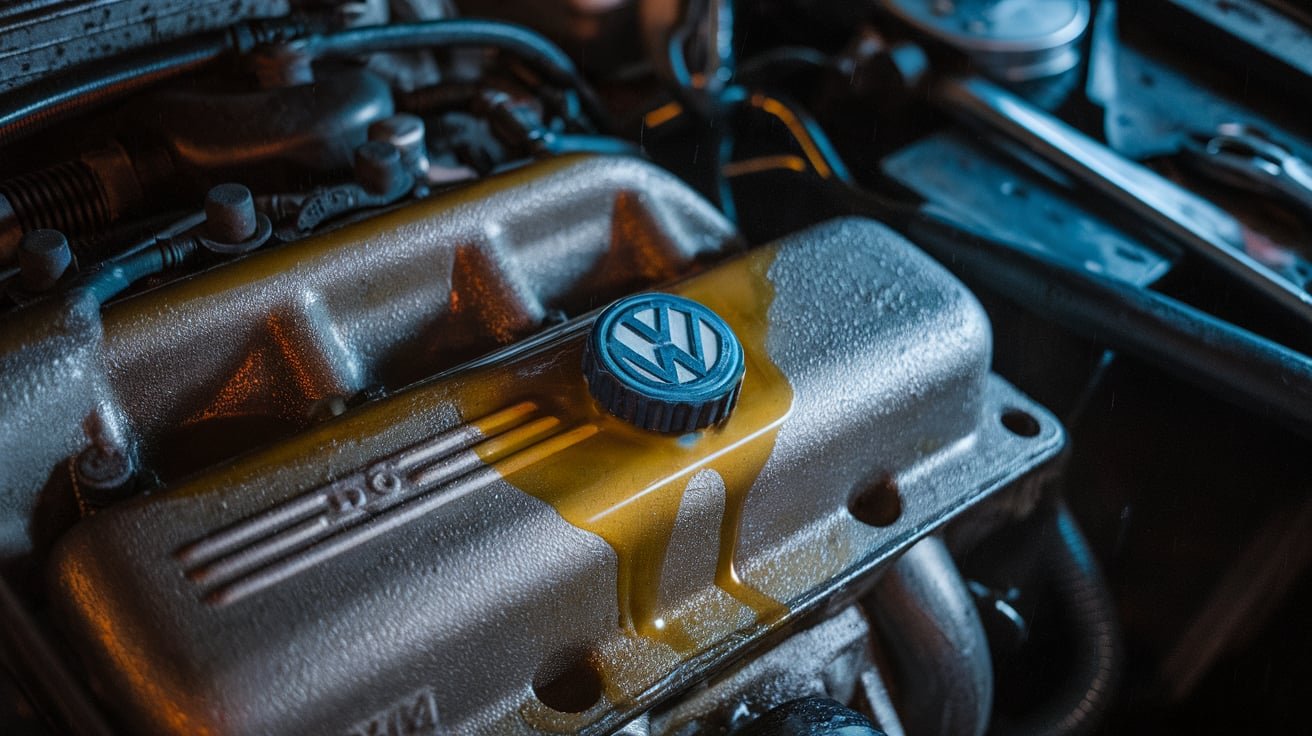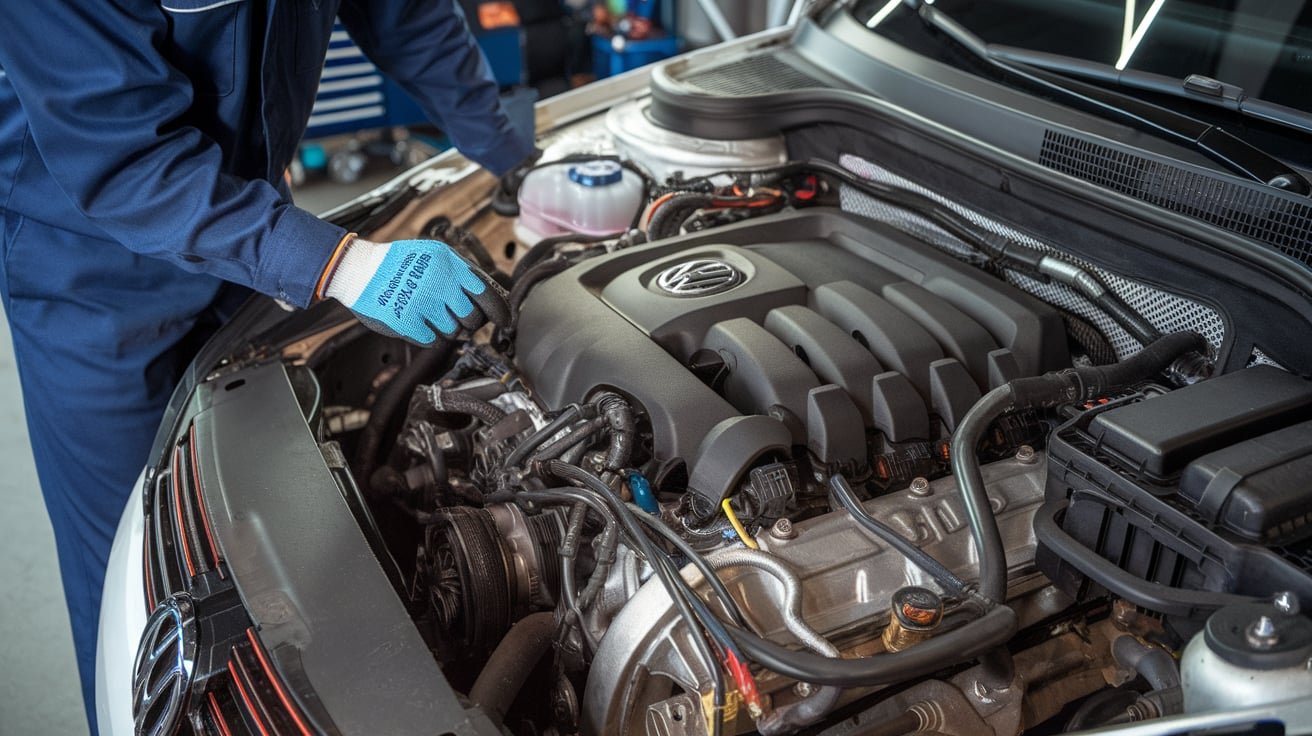
Top VW Engine Repair Problems and How to Fix Them in Dubai
Ever sat in Dubai traffic with your VW sputtering like it just ran a marathon in the desert? Yeah, we know that panic. The engine starts acting weird, warning lights flash, and suddenly you’re googling VW engine repair in Dubai while trying not to melt in your seat.
VW engine repair is a common search around here for a reason. These engines, while solid, aren’t bulletproof. Especially not in a place where summer feels like the sun parked right above your car. Whether it’s overheating, oil leaks, or turbo tantrums, this guide breaks down common VW engine repair problems and how they’re actually fixed.
Most Common VW Engine Repair Issues | What Dubai Drivers Face
Ever wonder why your VW engine suddenly acts like it’s had enough of you? Well, it might be trying to tell you something. VW engine repair problems tend to show up quicker in Dubai than anywhere else, thanks to the city’s brutal mix of heat, traffic, and start-stop chaos.
- Overheating due to extreme heat
High outside temperatures plus slow-moving traffic equals coolant system overload. Radiators, fans, and thermostats often can’t keep up in Dubai’s summer. You might see steam, a spiked temp gauge, or coolant bubbling out. - Timing chain stretch on TSI engines
The EA888 engine series has a known issue where the timing chain stretches over time. This leads to misfires, rough idle, engine light warnings, and if ignored, full engine failure. It’s one of the most common causes of VW engine repair visits in Dubai. - Oil consumption problems
Some VWs have a habit of sipping oil like it’s juice. You may never see a puddle under your car, but the dipstick keeps dropping. This constant consumption leads to low oil levels, risking internal wear if not topped off regularly.
If you’re not sure how to monitor it properly, check out How to Read Your VW Engine Oil Dipstick – Essential Tips for a simple guide that helps you stay ahead of potential oil-related engine wear.
- Turbocharger issues
If your VW is turbocharged, Dubai’s heat can be its worst enemy. Turbo bearings dry out, oil seals fail, and power drops off like a stone. You might also hear whining sounds or notice slower acceleration. These signs usually lead to VW engine repair involving turbo rebuilds or swaps. - Carbon buildup in DI engines
Direct-injection engines skip fuel over the intake valves, so carbon sticks and piles up fast. This buildup causes airflow restriction, misfires, and poor throttle response. You’ll feel your engine getting lazier even though it’s not that old.
Ignoring these issues might seem harmless at first, but they’ll snowball into expensive problems. Stay ahead of VW engine repair needs in Dubai, and you’ll avoid engine replacements that could wreck your wallet.

Overheating Woes | VW Engine Repair Tips for Dubai Heat
That moment when your temp gauge shoots up while you’re crawling through Sheikh Zayed Road traffic? Been there. Dubai’s climate doesn’t play nice with engines, and if you own a VW, you’re probably familiar with how quickly things can go south. VW engine repair linked to overheating is one of the most common reasons drivers end up at the garage.
- Weak water pump or thermostat
Plastic water pumps crack over time, especially under Dubai’s brutal heat. When they fail, coolant circulation stops. Thermostats, on the other hand, can get stuck shut and trap hot coolant in the engine, leading to immediate overheating. - Radiator fan malfunction
The radiator fan is crucial when you’re stuck in traffic or idling. If it doesn’t engage, the coolant doesn’t cool. Motors fail, relays short out, or control modules act up, all common triggers for unexpected VW engine repair in high-temp areas. - Low coolant level or airlocks
Sometimes the problem is simple but just as dangerous. Low coolant levels, often due to unnoticed leaks, or air pockets in the system block flow and trap heat. Regular top-ups and proper bleeding during coolant service help avoid this. - Old radiator clogged with deposits
Hard water, neglect, and age cause minerals to build up inside the radiator, cutting down its ability to transfer heat. You may not notice it right away, but performance drops over time until overheating becomes frequent.
If you spot steam, smell something sweet, or hear bubbling under the hood, pull over immediately. Ignoring these signs can cook your engine completely and push you into costly VW engine repair territory faster than you’d expect.
Oil Leaks & Gasket Fails | VW Engine Repair Must-Knows
Leaking oil isn’t just messy. It’s money dripping out of your engine and onto your driveway. And when you’re in Dubai’s heat, that little leak can quickly snowball into major engine drama. Most cases that start with “it’s just a few drops” often end up needing VW engine repair if ignored for too long.
- Valve cover gasket leak
Rubber gaskets tend to harden over time, and in Dubai, the heat speeds that up. The valve cover gasket seals the top of the engine, and once it cracks, oil escapes and burns off on the exhaust manifold. You’ll notice that burnt oil smell and maybe even smoke under the hood. - Oil pan gasket damage
The oil pan sits at the bottom of the engine and is vulnerable to impacts from speed bumps or rough roads. When the gasket wears out or gets damaged, slow leaks form. These can go unnoticed for weeks until the oil level starts dipping dangerously low, leading straight to VW engine repair work. - Rear main seal failure
This one’s deep in the engine bay between the engine and transmission, so it’s not easy to see. But once it fails, oil starts dripping where the gearbox meets the engine. It’s a labor-heavy repair, and many Dubai drivers don’t catch it until it’s already made a mess under the car and inside the bell housing. - Camshaft seals and timing cover leaks
These are subtle but sneaky. Leaks here tend to spread oil across the front of the engine, which can degrade the timing belt or chain over time. By the time you notice it, it might’ve already caused premature wear or triggered engine sensors.
Ignoring leaks isn’t just about stains on your garage floor. It’s about protecting your engine’s internals and avoiding deeper VW engine repair bills later. Catching these issues early keeps your engine happier and your wallet intact. And when you’re topping up oil or changing grades, make sure you’re using the correct type — using the wrong viscosity can cause serious damage. Learn more in What Happens If You Use The Wrong Oil Grade In Your Engine? before your next oil service.

Timing Chain Trouble | How VW Engine Repair Prevents Total Failure
If your VW sounds like a diesel when it starts or rattles like it’s chewing metal every morning, don’t brush it off. That noise is your engine waving a big red flag. In Dubai’s heat, timing chain wear is even more aggressive, and ignoring it can quickly turn into a full-blown VW engine repair nightmare.
- Chain tensioner failure
The chain tensioner keeps everything tight and in sync. When it fails, the chain goes loose, creating a loud slapping sound. Over time, that slack leads to the chain jumping teeth on the camshaft, throwing off timing and potentially causing the pistons to hit the valves. One minute it’s just a rattle, the next you’re looking at bent valves and a rebuild. - Chain guide wear
VW uses plastic chain guides in many engines, especially the EA888. Heat and oil breakdown cause them to crack or break entirely. When the guide fails, the chain moves erratically, which accelerates wear on the tensioner and chain itself. Eventually, that loose chain could snap. - Check engine light and fault codes
If you’re seeing engine codes like P0016 or P0341, your car’s ECU is already warning you about camshaft and crankshaft correlation issues. This means the timing is off. Even if the engine still runs, it’s not running right. And in Dubai, where stress on components is higher, this kind of issue demands immediate VW engine repair attention.
This is not the kind of issue to let ride. A skipped timing chain can destroy your engine in seconds, and fixing that damage costs way more than replacing the chain kit in time. Early VW engine repair here isn’t just smart, it’s survival for your engine.
Turbocharger Breakdown | VW Engine Repair for Boost-Related Faults
Feel like your VW’s lost its punch lately? Like it just gave up halfway through an overtake? That fading power could be your turbo calling it quits. Especially in Dubai’s oven-like climate, turbo components wear out faster than usual. And once that boost drops, most owners are in for some serious VW engine repair conversations.
- Worn turbo bearings
Turbo bearings spin at insanely high speeds, and when they wear out, the turbo can’t spin freely. You’ll hear a high-pitched whining or dentist-drill type sound. Acceleration becomes sluggish, and in some cases, blue smoke starts puffing out of the exhaust due to oil burning through the turbo seals. - Cracked intercooler pipes
Boost doesn’t get to the engine if it’s leaking on the way there. Cracked or loose intercooler pipes lead to a loss of pressure. This means slower throttle response and poor acceleration. Sometimes it’s a simple clamp, other times the pipe itself is damaged from heat expansion or road debris. - Oil starvation
Turbochargers rely on a steady oil flow for lubrication and cooling. If the oil level drops or the feed line clogs up, the turbo can burn out fast. You might not notice until it’s too late, and then boom, full VW engine repair is needed to fix the aftermath. - Wastegate or actuator faults
The wastegate controls boost pressure. If it’s stuck open, you lose power. If it’s stuck closed, you risk overboosting and engine knock. Either way, it throws off your car’s performance and puts unnecessary stress on internal components.
Turbo failure isn’t just about losing speed, it’s often the start of a domino effect that takes out other engine systems too. Catching the symptoms early can turn a potential turbo replacement into a minor VW engine repair and keep your ride pulling strong.
For expert diagnostics, timing chain replacement, and preventive maintenance, trust our VW repair specialists in Dubai — experienced technicians who understand the city’s climate and your engine’s unique demands.

Carbon Buildup Fixes | VW Engine Repair for Direct Injection Systems
Ever feel like your engine’s breathing through a straw? Throttle response turns mushy, performance drops, and you’re constantly wondering where the power went. Welcome to the not-so-glamorous world of carbon buildup. It’s one of those silent performance killers that often leads to unexpected VW engine repair in places like Dubai where short trips and constant AC use are common.
- Intake valve buildup
In direct-injection engines, fuel is sprayed directly into the cylinder, skipping the intake valves. This means nothing washes off the natural oil vapors and dirt that cling to the valves. Over time, that grime hardens into black sludge that restricts airflow, making the engine gasp for breath. - Poor acceleration and misfires
Carbon buildup chokes the air passages, which messes with the air-fuel ratio. This leads to weak acceleration, inconsistent idling, engine hesitation, and even cylinder misfires. Check engine lights pop on, and before you know it, you’re headed for VW engine repair to figure out why your car suddenly feels like a slug. - Walnut blasting or chemical cleaning
Mechanics have two main ways to fix this. One is walnut blasting, which involves shooting crushed walnut shells at the valves to clean them without engine disassembly. The other uses chemical sprays and scrubbing tools to dissolve and remove buildup. Both are effective, depending on how bad things have gotten.
This isn’t just a problem for high-mileage cars. In Dubai, with constant stop-and-go traffic and short drives, buildup can start as early as 40,000 to 60,000 kilometers. Getting ahead of it means avoiding deeper VW engine repair and bringing your engine’s power back to life.
FAQs | VW Engine Repair Questions Answered
Q: Why does my VW burn oil even with no leaks?
A: Some VW engines, especially the EA888 series, are known for oil consumption even when everything looks fine from the outside. This is due to piston ring design and internal blow-by. In Dubai’s extreme heat, that natural consumption increases because the oil thins faster and evaporates more easily. If ignored, it could lead to low levels that spark bigger VW engine repair issues down the line.
Q: My VW shakes at startup. Should I be worried?
A: Yeah, it’s not something to ignore. That shaking could be a timing chain issue, especially if it’s worse when the engine is cold. Carbon buildup on the intake valves can also mess with combustion at startup. Either way, it’s a common early symptom we see before full-on VW engine repair becomes necessary.
Q: Can I still drive with a turbo whine?
A: Technically, yes. But do you really want to gamble with your turbo’s life? That high-pitched whistle or whine is usually the sound of worn bearings or a failing shaft. Keep driving on it and you risk turbo failure, oil contamination, and even engine damage. It’s one of the top turbo-related VW engine repair cases we see in Dubai.
Q: Do all VWs suffer timing chain problems?
A: Not all, but the EA888 engines found in models like the Golf GTI, Passat, and Tiguan are known for it. The timing chain tensioner wears prematurely, especially in hot climates. A little rattle now can lead to a broken engine later. Getting the timing system inspected early can prevent deeper VW engine repair costs.
Q: What’s the best oil for my VW in Dubai?
A: You want a full synthetic oil, either 5W-40 or 5W-30, that meets VW’s 504.00 or 507.00 spec. These oils are built to withstand high temperatures and protect against wear, sludge, and carbon buildup. Inconsistent oil quality is one of the silent causes behind many VW engine repair issues we’ve seen over the years.
